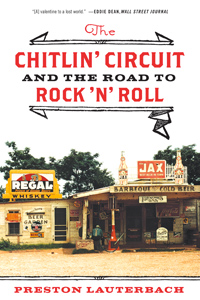 Born June 6, 1902, Fulton, Mississippi
Born June 6, 1902, Fulton, Mississippi
Died July 12, 1947, Seaside, Oregon
Circuit active: 1934-47
While Walter Barnes plied the black-owned plank ballrooms down South during the early ’30s, bandleader Jimmie Lunceford broke into the upper echelon of the biz, which was controlled by a powerful conglomerate of mob-style nightclub bosses, white New York talent agents, and the Musicians Union. The lines between these entities were blurry where they existed at all. Collectively, they were known as the syndicate. They controlled the top black jazz bands, like Duke Ellington, Cab Calloway, and Count Basie.
Lunceford’s talent was rated swing aristocracy—his Harlem Express band took over Cab Calloway’s Cotton Club residency in  1934, after Calloway had bumped Ellington. But Lunceford bristled at syndicate business practices. He pulled out of Harlem’s swank Cotton Club and took his topflight orchestra on tour through the Deep South’s little Cotton Clubs, where the territory was too vast for the union to effectively police and the money too thin for the big agents to fool with.
1934, after Calloway had bumped Ellington. But Lunceford bristled at syndicate business practices. He pulled out of Harlem’s swank Cotton Club and took his topflight orchestra on tour through the Deep South’s little Cotton Clubs, where the territory was too vast for the union to effectively police and the money too thin for the big agents to fool with.
 As Barnes innovated the use of print media to effectively promote far-ranging tours through black America, Lunceford’s management team innovated the use of another emerging technology to propel the Harlem Express. As Seeburg jukeboxes were installed in every nickel and dime black café down South, an idea dawned on Dave Clark, who led a blues band and gophered for a Jackson, Tennessee dance promoter. “Every town Lunceford was playing in, I could go in front of the band and get his record on the jukebox.”
As Barnes innovated the use of print media to effectively promote far-ranging tours through black America, Lunceford’s management team innovated the use of another emerging technology to propel the Harlem Express. As Seeburg jukeboxes were installed in every nickel and dime black café down South, an idea dawned on Dave Clark, who led a blues band and gophered for a Jackson, Tennessee dance promoter. “Every town Lunceford was playing in, I could go in front of the band and get his record on the jukebox.”
Lunceford brought star power and new promotional tactics to the chitlin’ circuit, but perhaps his most enduring legacy began before he made a name for himself on the bandstand. From 1927-30, Lunceford taught at Manassas High School in Memphis, Tennessee. Before Lunceford, the segregated black public schools offered no formal training in music. Lunceford raised funds for a school band in the North Memphis community, and helped institute music education in the black Memphis public schools. Over the next four decades, the Memphis public schools produced world-renowned talent—soul men Willie Mitchell, Booker T. Jones, and Isaac Hayes, members of the Hi Rhythm and the  Bar-Kays; leader of the Ray Charles orchestra, Hank Crawford; and ingenious jazz soloists like pianist Phineas Newborn Jr and multi-instrumentalist Charles Lloyd.
Bar-Kays; leader of the Ray Charles orchestra, Hank Crawford; and ingenious jazz soloists like pianist Phineas Newborn Jr and multi-instrumentalist Charles Lloyd.
Lunceford isn’t as well-remembered as his peers, but those who knew classified him at the top. “Jimmie Lunceford has the best of all bands,” remarked “In the Mood” composer Glenn Miller. “Duke is great, Basie is remarkable, but Lunceford tops them both.” The Chitlin’ Circuit highlights this key figure in American music.

